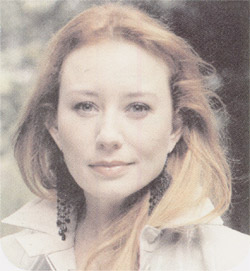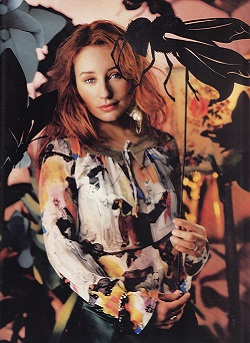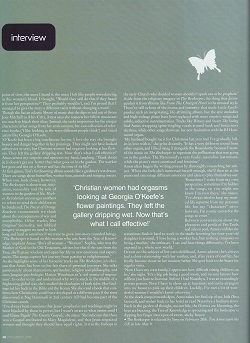|

songs | interviews | photos | tours | boots | press releases | timeline
Diva (UK)
March 2005

TORI AMOS
has the kooky queen of alt pop chilled out?
From Little Earthquakes, musical moments are born. Diva takes a stroll in the garden and shoots the breeze with the beekeeper, Tori Amos
Words by Sarah Jane
Tori Amos is sitting in the uber-swanky Adams Street Private Member's club, tucked away in London's West End. It's the weekend before Christmas 2004, and she has just put the final touches to her forthcoming album at her home studio in Cornwall, after many hours spent crouched over a mixing board, she's exhausted but insists she'll be fine as soon as she's had a cup of tea. A sequined t-shirt, smart jeans and cosy orange cardigan adorn her slim five foot four frame while her face radiates calm and positive energy. Her soft, North Carolina accent gives her voice a warm, hypnotic quality. One of the most interesting and provocative songwriters since Kate Bush, she oozes charm, wit, sensitivity and sensuality.
Instantly friendly and tactile - she looks me right in the eye throughout and frequently squeezes my arm like an old friend - she thinks long and hard before answering questions, and at one point breaks off mid-sentence to sing me a heart stopping a cappella version of one her new songs. Now, however, Amos is milling over the fact that it's been over almost 15 years since she released her solo debut - Little Earthquakes. "It sounds naive but the whole time I was writing and recording Little Earthquakes, it never dawned on me that the album might hit a raw nerve with people," she whispers. "I was focused on trying to express myself honestly and make the best record I could. It wasn't like there was anybody waiting for it, because nobody really knew who I Was or what I did. In many ways, Under the Pink was a harder, more rewarding record to make because it felt like all eyes were on me and I had to really push myself."
 Little Earthquakes has become the musical equivalent of Sylvia Plath's The Bell Jar for many fans, myself included. Hearing this Amos smiles and admits it was a happy accident. "I knew I'd written a collection of songs I was proud of, but had no idea so many women would relate to them on such a profound level. I was at a crossroads at the time about what kind of woman I wanted to be. I was living the life I thought I should lead, and I took on board other people's opinions like some women put on make up. It wasn't until I was a bit older that I began to realise I could set my own parameters and live a life that didn't involve having to lose pieces of myself every day."
Little Earthquakes has become the musical equivalent of Sylvia Plath's The Bell Jar for many fans, myself included. Hearing this Amos smiles and admits it was a happy accident. "I knew I'd written a collection of songs I was proud of, but had no idea so many women would relate to them on such a profound level. I was at a crossroads at the time about what kind of woman I wanted to be. I was living the life I thought I should lead, and I took on board other people's opinions like some women put on make up. It wasn't until I was a bit older that I began to realise I could set my own parameters and live a life that didn't involve having to lose pieces of myself every day."
"Of course, you can listen to a record or go and see a piece of art, but there isn't a short cut to being initiated into the mysteries of 'Woman,'" she continues "It's not like you can go somewhere and study being a woman for a month you have to locate the secret door in the wardrobe and figure out how to open it."
"Occasionally, somebody asks when I am going to make a Little Earthquakes II but I couldn't make that record again; I'm not that same person and I wouldn't want to be."
We touch for a moment on her sixth album, Strange Little Girls. Condemned and criticised by most of the male critics who reviewed it, it was an ambitious collection that included radical interpretations of popular songs by male songwriters like Lou Reed, Bob Geldof, The Stranglers and The Beatles.
"That record was about picking the right songs," she retorts. "My challenge was to study them and try to tell the stories hidden within them. Eminem's version of Bonnie and Clyde, for example, is very much from the father's point of view, the more I heard it, the more I felt like people were dancing in this woman's blood. I thought, 'Would they still do that if they heard it from her perspective?' They probably wouldn't, and I'm proud that I managed to give the story a different twist without changing a word."
Though she has an eclectic library of music that she dips in and out of (from Joni Mitchell to Afro-Celt), Amos says she respects her fellow musicians too much to hijack their ideas. Instead she seeks inspiration for the unique characters in her songs from her environment, her vast collection of reference books, ("I like looking at the ways different people think") and visual artists like Georgia O'Keefe.
"O'Keefe has been a big touchstone for me. I love the way she brought beauty and danger together in her paintings. They might not have looked subversive or sexy. But Christian women had orgasms looking at her flowers. They left the gallery dripping wet. Now that's what I call effective!" Amos senses my surprise and squeezes my hand, laughing. "Think about it, it doesn't get any hotter than what goes on in the garden. The worker bee goes and sits on a flower and has the time of his life!"
At first glance, Tori's forthcoming album sounds like a gardener's wet dream. There are songs about butterflies, workers bees, a parasol and stinging insects. When you look closer, however, The Beekeeper is about trust, initiation, sensuality and the role of women in the garden of life. Mother Revolution encourages mothers to refuse to send their children to be butchers. The Power of Orange Knickers recommends we think about the consequences of war and xenophobia. Other tracks like Original Sinsuality, uses biblical imagery to suggest we need to look long and hard at ourselves if we want to grow into more rounded beings. "The Beekeeper is based on this woman who eats from the Tree of Knowledge," explains Amos. "She's all women - 'Woman.' Sophia, who was the Mother of God in the Old Testament, advises her that if she eats from the Tree, she'll attain wisdom and open her life to new emotions and experiences. The songs capture her journey from passion to enlightenment."
As she highlights some of her favourite tracks on The Beekeeper, it's obvious that Amos has been on her fair share of personal journeys. She talks passionately about shamanism, spirituality, religion and philosophy, and cites Jungian psychologist Marion Woodman as "a real source of inspiration." In order to try and understand why we're stuck in the middle of a frightening global war, she's studied the ideologies of both sides. Her findings led her back to the bible and the Koran. She also read a book that confirms how Christianity could have developed at a different pace if the texts discovered at Nag Hammadi in 2nd century AD had become part of the Christian cannon.
"I've always been conscious that Jesus' prophecies and teachings might have been hijacked by those in power, but I wasn't aware to what extent until I read Elaine Pagels' The Gnostic Gospels," she states. "She indicated that there was a Gospel attributed to Mary Magdalene, and that Jesus respected women and thought they should have equal rights. It was the bishops in the early Church who decided women shouldn't speak out or be prophets." Aside from religious imagery in The Beekeeper, the thing that distinguishes it from the album From the Choirgirl Hotel is the musical style. There's still echoes of the drama and intensity that made Little Earthquakes such an invigorating , life affirming album, but the epic melodies and high voltage piano have been replaced with more emotive and subtle, seductive instrumentation. Tracks like Witness and Sweet the Sting find Amos wrapping spine tingling vocals around funk and bossa nova rhythms, while other songs showcase her new fascination with the B3 Hammond organ.
"My husband bought me it for Christmas last year and I've gradually fallen in love with it," she grins dreamily. "It has a very different sound from other organs, and I like using it alongside the Bosendorfer because I wanted the music on The Beekeeper to represent the pollination that was going on in the garden. The Hammond's a very funky, masculine instrument whereas the piano's more emotional and feminine."
Amos often begins the writing process by thoroughly researching her subject. When she feels she's immersed herself enough, she'll then sit at the piano and encourage different emotions and ideas to play themselves out.
"Sometimes I write from my own perspective, sometimes I'm hidden in he songs, so you might not know I'm even there." She muses. "I've always tried to keep my musical life separate from my personal life, but my 'characters' never leave me. I am a sonic canvas for the songs to enter."
Between conversations about the pleasure and perils of Pro Tools and silicon soul, Amos confides she sometimes finds it hard to work in the studio knowing her four-year old daughter is around. "I love being a worker bee, but nothing compares to being a mother," she enthuses. "I see and hear things differently; I've been exposed to a whole new world."
Drawn on the subject of her own childhood, Amos admits she's always has a close relationship with her mother, and after years of conflict, has finally become closer to her Minister father. She goes back to the States for regular visits.
"Now I have my own family, I appreciate how difficult raising children can be." She sighs. "It's a big job being a good mom, and no-one knows how selfless you have to become. Before I had Natashya, I was an exceedingly private person. Now I have to show up at functions and invite strangers into my house to pick up their children. Luckily I've met a lot of wonderful women I wouldn't know otherwise."
As the clock creeps towards 8pm. Amos takes her final sip of tea, bids Diva farewell, and rushes back to her hotel to read Natashya a bedtime story. Back in the garden of thought, meanwhile, the flowers are blooming, the bees are buzzing, the Tree of Knowledge is sprouting and the beekeeper is dipping her fingers into a pot of sweet, sticky honey.
The Beekeeper is released by Sony on February 28th. Tori Amos tours the UK in late May.
original article
 

[scans by Sakre Heinze]
t o r i p h o r i a
tori amos digital archive
yessaid.com
|